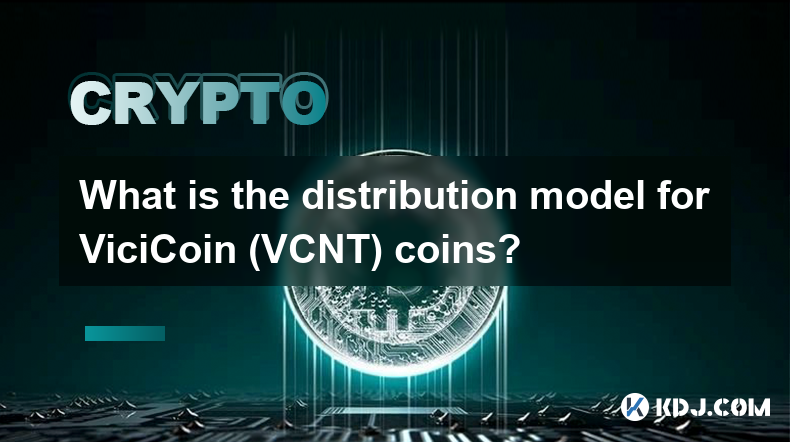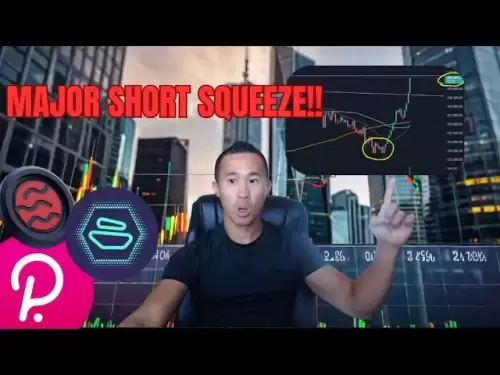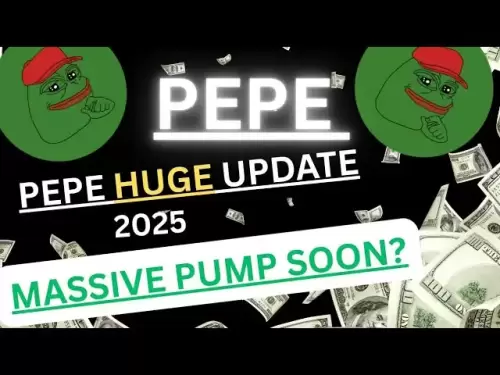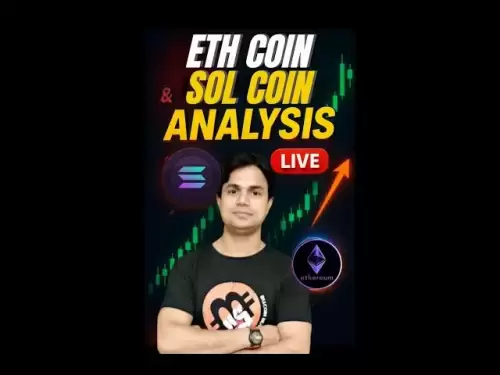-
 Bitcoin
Bitcoin $108,270.9768
2.07% -
 Ethereum
Ethereum $2,489.8066
2.50% -
 Tether USDt
Tether USDt $1.0004
0.01% -
 XRP
XRP $2.2035
0.66% -
 BNB
BNB $661.6608
2.32% -
 Solana
Solana $150.6425
2.13% -
 USDC
USDC $0.9999
-0.01% -
 TRON
TRON $0.2810
0.90% -
 Dogecoin
Dogecoin $0.1645
3.05% -
 Cardano
Cardano $0.5743
4.91% -
 Hyperliquid
Hyperliquid $38.8419
-0.15% -
 Bitcoin Cash
Bitcoin Cash $504.3134
-2.64% -
 Sui
Sui $2.8096
4.35% -
 Chainlink
Chainlink $13.3095
2.21% -
 UNUS SED LEO
UNUS SED LEO $8.9469
0.33% -
 Avalanche
Avalanche $17.9231
3.93% -
 Stellar
Stellar $0.2340
0.74% -
 Toncoin
Toncoin $2.8458
3.21% -
 Shiba Inu
Shiba Inu $0.0...01158
3.47% -
 Litecoin
Litecoin $86.0738
1.94% -
 Hedera
Hedera $0.1507
2.99% -
 Monero
Monero $319.8544
2.31% -
 Polkadot
Polkadot $3.4081
1.95% -
 Dai
Dai $1.0000
0.01% -
 Bitget Token
Bitget Token $4.5645
0.91% -
 Ethena USDe
Ethena USDe $1.0002
0.00% -
 Uniswap
Uniswap $7.2959
5.27% -
 Aave
Aave $272.4623
2.90% -
 Pepe
Pepe $0.0...09680
2.96% -
 Pi
Pi $0.4955
0.78%
What is the distribution model for ViciCoin (VCNT) coins?
ViciCoin's distribution model allocates coins to various stakeholders, including public sale (40%), private sale (30%), and community rewards (5%), ensuring fair and equitable distribution while incentivizing active users.
Jan 08, 2025 at 06:24 am

Key Points:
- Total Coin Supply: The total supply of ViciCoin is 100,000,000 coins.
- Distribution Method: The coins are distributed through a combination of public sale, private sale, team allocation, and community rewards.
- Tokenomics: ViciCoin has a unique tokenomics model designed to reward active users and incentivize long-term holding.
ViciCoin (VCNT) Distribution Model
The ViciCoin distribution model is designed to ensure fair and equitable distribution of the coins, while incentivizing early adopters and rewarding active users. The following table summarizes the distribution percentages:
| Category | Allocation Percentage |
|---|---|
| Public Sale | 40% |
| Private Sale | 30% |
| Team | 15% |
| Development Fund | 5% |
| Marketing | 5% |
| Community Rewards | 5% |
1. Public Sale (40%)
The public sale is open to everyone and will be conducted through a reputable cryptocurrency exchange. The coins will be sold at a fixed price, with a portion of the proceeds allocated to development and marketing.
2. Private Sale (30%)
The private sale is a pre-launch sale conducted with a select group of investors. Coins sold in the private sale will be subject to a lock-up period before they can be traded.
3. Team Allocation (15%)
The team allocation is held by the project founders and developers and will be used to support the project's long-term development.
4. Development Fund (5%)
The development fund is allocated to cover the ongoing costs of research, development, and maintenance of the ViciCoin ecosystem.
5. Marketing Fund (5%)
The marketing fund is used to promote the ViciCoin project and attract new users.
6. Community Rewards (5%)
The community rewards allocation is reserved for incentivizing user engagement, participation, and contributions.
Tokenomics
ViciCoin employs a unique tokenomics model to reward active users and incentivize long-term holding. The key features of the tokenomics include:
- Transactional Tax: Every ViciCoin transaction incurs a small tax, which is divided between token buybacks, community rewards, and project development.
- Buyback and Burn: A portion of the transactional tax is used to buy back ViciCoins from the market and burn them, reducing the supply and increasing scarcity.
- Community Governance: ViciCoin holders can participate in community governance through voting proposals. Proposals may include changes to the tokenomics, development roadmap, and community initiatives.
FAQs
1. What is the use case of ViciCoin?
ViciCoin is designed to be a versatile cryptocurrency that can be used for:
- Making online and offline payments
- Staking and earning rewards
- Participating in decentralized finance (DeFi) applications
- Accessing exclusive products and services within the ViciCoin ecosystem.
2. What is the expected ROI of ViciCoin?
The ROI of ViciCoin will depend on the adoption, demand, and development of the project. While there are no guarantees, the unique distribution model and tokenomics of ViciCoin provide incentives for long-term value growth.
3. What are the benefits of holding ViciCoin?
Holding ViciCoin provides several benefits, including:
- Earning rewards through staking and participation
- Participating in community governance and shaping the project's future
- Accessing exclusive products and services within the ViciCoin ecosystem
Disclaimer:info@kdj.com
The information provided is not trading advice. kdj.com does not assume any responsibility for any investments made based on the information provided in this article. Cryptocurrencies are highly volatile and it is highly recommended that you invest with caution after thorough research!
If you believe that the content used on this website infringes your copyright, please contact us immediately (info@kdj.com) and we will delete it promptly.
- Mormon Gold, Rare Coins, and Heritage Auctions: A Collector's Bonanza
- 2025-07-03 02:30:12
- Crypto News Flash: Real-Time Bitcoin Intelligence and XRP's Price Dip
- 2025-07-03 02:35:12
- Whale Supply Dwindles: What It Means for Bitcoin Investors
- 2025-07-03 01:10:12
- Altcoins to Watch: BDAG, APT, and DOT Lead the Charge in the Next Bull Run
- 2025-07-03 01:10:12
- AI Alliance Ignites: FET Price Rally on Horizon as Volatility Hits Rock Bottom
- 2025-07-03 01:50:12
- BONK Price Surge, Dogecoin Patterns, and BlockDAG's Double Up Offer: What's the Buzz?
- 2025-07-03 01:50:12
Related knowledge

How to customize USDT TRC20 mining fees? Flexible adjustment tutorial
Jun 13,2025 at 01:42am
Understanding USDT TRC20 Mining FeesMining fees on the TRON (TRC20) network are essential for processing transactions. Unlike Bitcoin or Ethereum, where miners directly validate transactions, TRON uses a delegated proof-of-stake (DPoS) mechanism. However, users still need to pay bandwidth and energy fees, which are collectively referred to as 'mining fe...

USDT TRC20 transaction is stuck? Solution summary
Jun 14,2025 at 11:15pm
Understanding USDT TRC20 TransactionsWhen users mention that a USDT TRC20 transaction is stuck, they typically refer to a situation where the transfer of Tether (USDT) on the TRON blockchain has not been confirmed for an extended period. This issue may arise due to various reasons such as network congestion, insufficient transaction fees, or wallet-rela...

How to cancel USDT TRC20 unconfirmed transactions? Operation guide
Jun 13,2025 at 11:01pm
Understanding USDT TRC20 Unconfirmed TransactionsWhen dealing with USDT TRC20 transactions, it’s crucial to understand what an unconfirmed transaction means. An unconfirmed transaction is one that has been broadcasted to the blockchain network but hasn’t yet been included in a block. This typically occurs due to low transaction fees or network congestio...

How to check USDT TRC20 balance? Introduction to multiple query methods
Jun 21,2025 at 02:42am
Understanding USDT TRC20 and Its ImportanceUSDT (Tether) is one of the most widely used stablecoins in the cryptocurrency market. It exists on multiple blockchain networks, including TRC20, which operates on the Tron (TRX) network. Checking your USDT TRC20 balance accurately is crucial for users who hold or transact with this asset. Whether you're sendi...

What to do if USDT TRC20 transfers are congested? Speed up trading skills
Jun 13,2025 at 09:56am
Understanding USDT TRC20 Transfer CongestionWhen transferring USDT TRC20, users may occasionally experience delays or congestion. This typically occurs due to network overload on the TRON blockchain, which hosts the TRC20 version of Tether. Unlike the ERC20 variant (which runs on Ethereum), TRC20 transactions are generally faster and cheaper, but during...

The relationship between USDT TRC20 and TRON chain: technical background analysis
Jun 12,2025 at 01:28pm
What is USDT TRC20?USDT TRC20 refers to the Tether (USDT) token issued on the TRON blockchain using the TRC-20 standard. Unlike the more commonly known ERC-20 version of USDT (which runs on Ethereum), the TRC-20 variant leverages the TRON network's infrastructure for faster and cheaper transactions. The emergence of this version came as part of Tether’s...

How to customize USDT TRC20 mining fees? Flexible adjustment tutorial
Jun 13,2025 at 01:42am
Understanding USDT TRC20 Mining FeesMining fees on the TRON (TRC20) network are essential for processing transactions. Unlike Bitcoin or Ethereum, where miners directly validate transactions, TRON uses a delegated proof-of-stake (DPoS) mechanism. However, users still need to pay bandwidth and energy fees, which are collectively referred to as 'mining fe...

USDT TRC20 transaction is stuck? Solution summary
Jun 14,2025 at 11:15pm
Understanding USDT TRC20 TransactionsWhen users mention that a USDT TRC20 transaction is stuck, they typically refer to a situation where the transfer of Tether (USDT) on the TRON blockchain has not been confirmed for an extended period. This issue may arise due to various reasons such as network congestion, insufficient transaction fees, or wallet-rela...

How to cancel USDT TRC20 unconfirmed transactions? Operation guide
Jun 13,2025 at 11:01pm
Understanding USDT TRC20 Unconfirmed TransactionsWhen dealing with USDT TRC20 transactions, it’s crucial to understand what an unconfirmed transaction means. An unconfirmed transaction is one that has been broadcasted to the blockchain network but hasn’t yet been included in a block. This typically occurs due to low transaction fees or network congestio...

How to check USDT TRC20 balance? Introduction to multiple query methods
Jun 21,2025 at 02:42am
Understanding USDT TRC20 and Its ImportanceUSDT (Tether) is one of the most widely used stablecoins in the cryptocurrency market. It exists on multiple blockchain networks, including TRC20, which operates on the Tron (TRX) network. Checking your USDT TRC20 balance accurately is crucial for users who hold or transact with this asset. Whether you're sendi...

What to do if USDT TRC20 transfers are congested? Speed up trading skills
Jun 13,2025 at 09:56am
Understanding USDT TRC20 Transfer CongestionWhen transferring USDT TRC20, users may occasionally experience delays or congestion. This typically occurs due to network overload on the TRON blockchain, which hosts the TRC20 version of Tether. Unlike the ERC20 variant (which runs on Ethereum), TRC20 transactions are generally faster and cheaper, but during...

The relationship between USDT TRC20 and TRON chain: technical background analysis
Jun 12,2025 at 01:28pm
What is USDT TRC20?USDT TRC20 refers to the Tether (USDT) token issued on the TRON blockchain using the TRC-20 standard. Unlike the more commonly known ERC-20 version of USDT (which runs on Ethereum), the TRC-20 variant leverages the TRON network's infrastructure for faster and cheaper transactions. The emergence of this version came as part of Tether’s...
See all articles

























































































